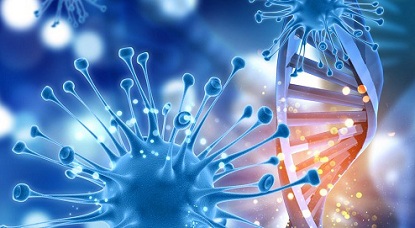Human Genetic Mutations PiZ And PiS Found In Segment Of Population Adds Greater Risk Of Illness And Death From COVID-19 According To Israeli Study
Source: Human Genetic Mutations PiZ And PiS Sep 25, 2020 4 years, 6 months, 3 weeks, 4 days, 21 hours, 29 minutes ago
Human Genetic Mutations PiZ And PiS found in segments of the general population contributes to a greater risk of severity and mortality from COVID-19 disease according to researchers from Tel Aviv University-Israel.

Accordingly these mutations lead to deficiency in the alpha1-antitrypsin protein, which protects lung tissues from damage in case of severe infections.
The study findings were published in the journal: FASEB, a journal of the Federation of American Societies For Experimental Biology.
https://faseb.onlinelibrary.wiley.com/doi/10.1096/fj.202002097
Previous studies have already associated deficiency in this protein with inflammatory damage to lung function in other diseases.
The research was study was led by Professor Dr David Gurwitz, Professor Dr Noam Shomron, and MSc candidate Guy Shapira of Tel Aviv University’ Sackler Faculty of Medicine,
The study team analyzed data from 67 countries on all continents.
Detailed comparisons revealed a highly significant positive correlation between the prevalence of the two mutations in the population and COVID-19 mortality rates (adjusted to size of the population) in many countries, such as the U.S., the UK, Belgium, Spain, Italy, and more.
The researchers consequently suggest that these mutations may be additional risk factors for severe COVID-19.
The team now propose that their findings should be corroborated by clinical trials, and if validated should lead to population-wide screening for identifying carriers of the PiS and/or PiZ mutations.
Once identified, such individuals should then be advised to take extra measures of social distancing and later be prioritized for vaccination once vaccines are available.
The researchers say that these steps can be effective in reducing COVID-19 morbidity and fatality rates.
Detailed analysis of databases reveals that in Belgium, where 17 of every 1,000 people carry the PiZ mutation (the more dominant of the two mutations discussed in this study), the COVID-19 mortality rate was 860 per million according to figures for September 2020.
It was found that In Spain the picture is similar: 17 of every 1,000 citizens carry the PiZ mutation, and the COVID-19 fatality rate is 640 per million.
In America, where 15 per 1,000 are carriers, 590 of every million died of the coronavirus.
Also the numbers in the UK are in line with the overall trend: 14 per 1,000 carry the mutation and 60 per million have died of COVID-19. In Italy, where 13 per 1,000 are carriers, the mortality rate is 620 per million. In Sweden, where 13 per 1,000 are carriers, the fatality rate is 570 per million.
Interestingly on the other hand, the study team found that in many countries in Africa and South East Asia, where these mutations are relatively rare, (due to perhaps epigenetic changes) COVID-19 mortality rates are correspondingly low as of September 2020.
In Japan, where 9 of every million died in the pandemic
, the mutations' prevalence is negligible. Similar numbers were also found in China, South Korea, Taiwan, Thailand, Vietnam, and Cambodia.
The study team concluded, "Our data analysis reveals a strong correlation between these mutations and severe illness and death from COVID-19. We call upon the research community to test our hypothesis against clinical data, and also call upon decision makers in every country to conduct population-wide screening for identifying mutation carriers and prioritize them for vaccination once COVID-19 vaccines have been approved. In the meantime, carriers should be notified that they may belong to a high-risk group and advised to maintain strict social isolation."
It is emerging more day by day that a variety of factors contributes to COVID-19 disease severity and mortality. A variety of human genes are also at play.
For more on
Human Genetic Mutations, keep on logging to Thailand Medical News.
